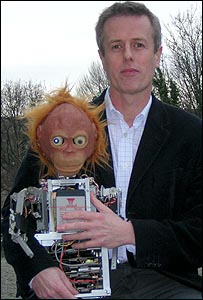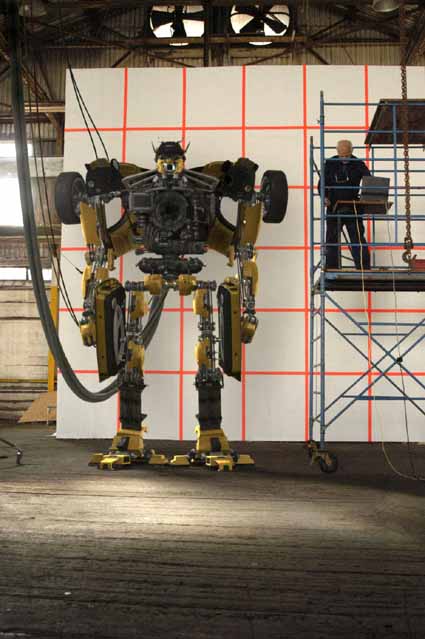Mini Cooper Robot : Be sure, this is a fake!! It’s an Ad for Mini Cooper / BMW : good idea, really!!
😉
Vehicle to autonomous biped robot conversion for the Mini Cooper r50.
I first had the vision to build a robot while working as an engineer on the old Mini Coopers in the late 1960s. There were no real robots at the time of course, so it was purely science-fiction. But I always believed a robot would be the most natural complement to the automobile – a full biped, intelligent version having great strength, dexterity and a library of mechanical knowledge. I imagined a robot with the ability to repair vehicles, direct traffic and watch over high-accident crossroads to preempt accidents.
This ambition started to look possible when work began on the new Mini. I’ve always believed BMW overbuilds many of their parts, so the over-building of certain Mini applications for my robotics use went unnoticed. In 1998, I began tests in a remote location outside Oxford.
In 2000 I thought my formal connection to Mini might be severed when Rover was sold by BMW. Luckily, BMW chose to retain the Mini brand. Subsequently, a few engineers would need to stay in England – Oxford to be exact. I was slated for retirement and was originally from the Oxford area so it raised little suspicion when I offered to stay. From then on, progress was swift.
[…]
Wired 12.07: The Humanoid Race
Machines are getting more and more like the rest of us. A piece-by-piece guide to the globe’s most advanced bots.
By Robert Capps
It was an astounding request. A year ago, neuroscientist Mitsuo Kawato called on the Japanese government to commit 50 billion yen ($446 million) a year for the next three decades. The dream: an Apollo-like program to build a robot with the mental, physical, and emotional capabilities of a 5-year-old child. Kawato called his plan the Atom Project, named for the popular postwar cartoon Tetsuwan Atom (known as Astroboy in the US), the story of a superhero boy robot.
Today the Atom Project remains little more than an audacious proposal. But the science behind it is quite real. With each advance in computing speed, battery capacity, camera and motor miniaturization, and software capability, the world grows closer to the ultimate goal of robotics: a walking, talking, feeling android worthy of our cinematic inspirations.
Consider the progress of just the past 15 years. There are now robots that can get around on two legs, participate in simple conversations, and manipulate objects in rudimentary ways. Of course, we don’t yet have a bot that can navigate downtown Manhattan, tie its shoelaces, or even tell a chair from a desk. MIT’s Cynthia Breazeal holds out hope that within five years, robots will cross a critical threshold, becoming partners rather than tools – in other words, we’ll have friends, not appliances. And while there are a number of extremely complex problems to solve before we can make something as advanced as Sonny, the star of I, Robot, we’re getting there, one piece at a time. To find out where the state of the art lies, Wired surveyed the projects that might one day add up to an android just like the rest of us.
MUSCLES
TRON-X: Festo AG specializes in assembly-line robots – the kind that build cars, construct PCs, and pack microwave dinners into little cardboard boxes. To show off its skill at building air-powered machines, the company made Tron-X, an android given life by 200 pneumatic cylinders. By finely controlling the air pumping through Tron-X’s tubes, operators can command it to dance, change facial expressions, and make complicated hand gestures.
[…]
seniors : Japan : a robot designed to help people to walk [TheMatureMarket.com]
Yoshiyuki Sankai, a professor at Tsukuba University in Japan is starting to commercialize a robot designed to help people with weakened leg muscles to walk smoothly.
The Robot Suit detects electric currents produced when people move their leg muscles. They then help the user move their legs smoothly, using motors installed at their waists and knees.
[…]
STUFF : NATIONAL NEWS – STORY : New Zealand’s leading news and information website: Inventor builds robot with personality
Mark Tilden believes robots have an image problem.
The Daleks from Dr Who and R2D2 from Star Wars have a lot to answer for.
‘They’ve always been so serious. And because they’ve been so mechanical, their actions look threatening.’
So Dr Tilden set out to produce a friendly robot with personality and a sense of humour that could move around easily.
[…]
The origin of ‘robot’? Czech it out
The Arizona Republic
Jun. 10, 2004 12:00 AM
QUESTION: Where do the terms ‘robot’ and ‘robotics’ come from?
[…]
Brain learns like a robot: Scan shows how we form opinions.
10 June 2004
TANGUY CHOUARD
Researchers may have pinpointed the brain regions that help us work out good from bad. And their results suggest that humans and robots are more alike than we may care to admit, as both use similar strategies to make value judgements.
[…]
Wired News: Robots Invade San Francisco
02:00 AM Mar. 23, 2004 PT
Over 400 robots rolled, walked, climbed and strutted their stuff at the first Robolympics this past weekend in San Francisco’s Fort Mason. Engineers and school kids, coming from as far away as Korea and Belgium, brought their creations to compete in contests of strength, agility and intelligence.
The biggest draw was the battling bots. Armed machines with names like ‘Max Wedge’ and ‘First Abe Lincoln on the Moon’ met in a closed arena to rend each other appendage from appendage. Often resembling murderous pizza boxes, the contestants were divided into weight classes ranging from 340-pound behemoths to one pound and below.
[…]
BBC NEWS | UK | Wales | A Grand plan for brainy robots
BBC News Online Wales

On a good day, Lucy can tell a banana apart from an apple.
And that’s handy skill to have if you are an orang-utan. Even a robotic one.
It might not sound like much to a too-clever-to-know-it human like you or me, but it represents pioneering work in the field of artificial intelligence.
And it is all down to one man working alone for years – in his garage – because his mind is fired up by the power of the brain.
[…]
